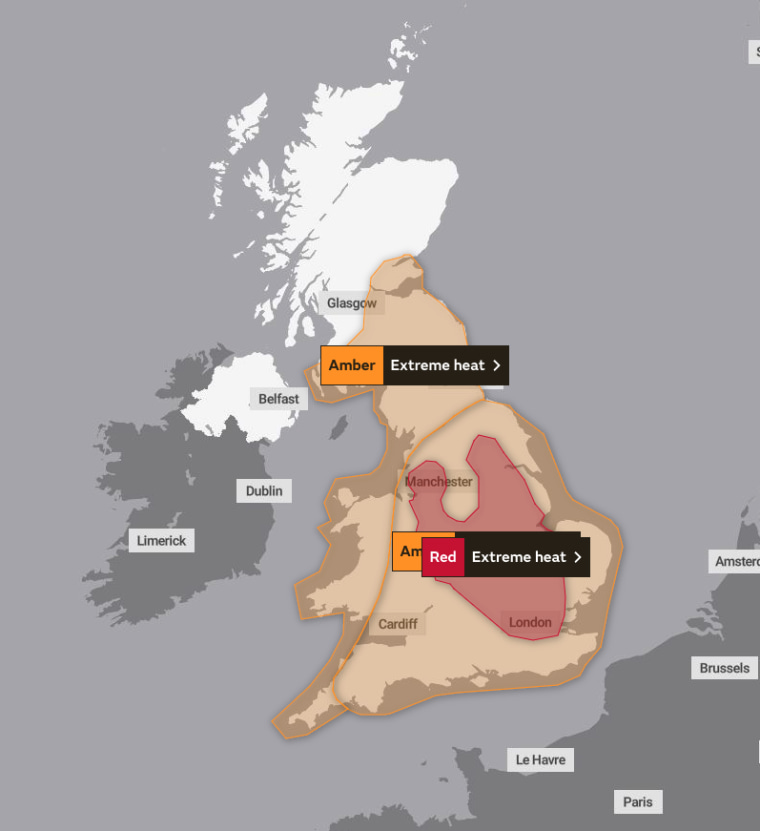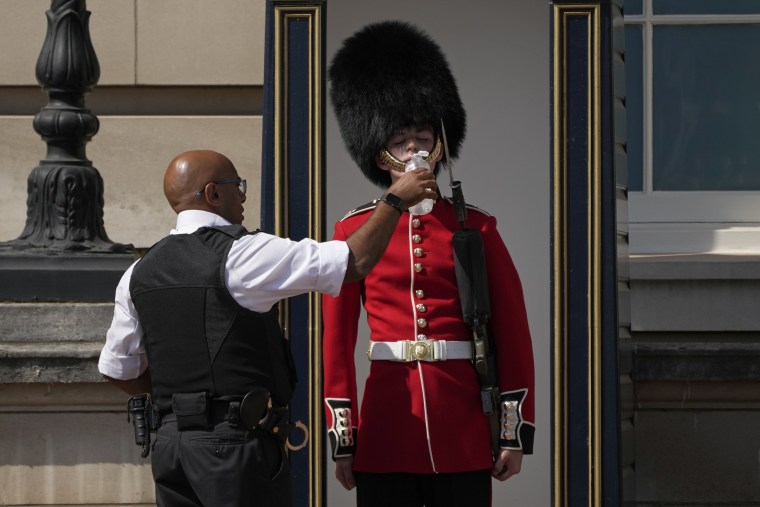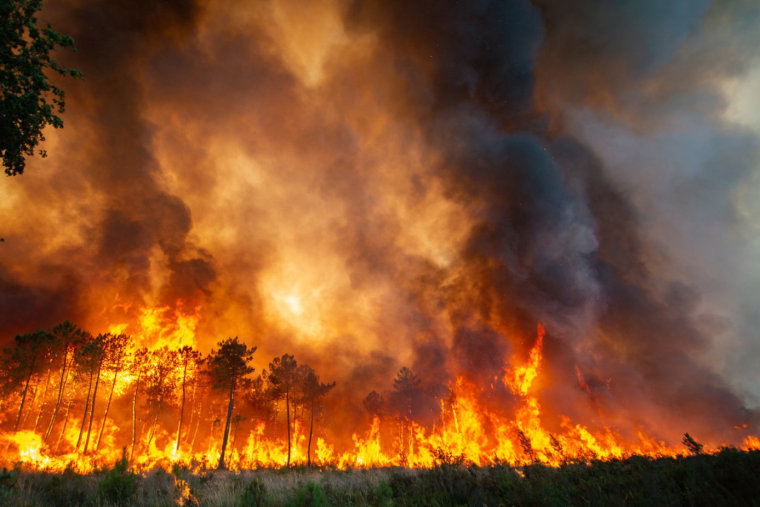LONDON — Britain was bracing for what could be its hottest day on record Monday or Tuesday, with forecasters warning the 105-degree temperatures risked deaths and crippled infrastructure.
Meanwhile, wildfires continued to rage across continental Europe, with authorities battling to control blazes across France, Greece, Italy and elsewhere. In Spain and Portugal, more than 1,000 deaths have been attributed to their brutal, week-long heatwave.
While wildfires have become depressingly familiar in some parts of the world, most of Britain is just waking up to the reality of extreme weather that’s exacerbated by manmade climate change.
The Meteorological Office, the United Kingdom’s national weather service, has issued its first ever “Red Warning” for extreme heat, urging people to avoid exercise, travel or even going outside if possible. There was a 50% chance the U.K. could record its hottest temperature to date, currently 101.6 Fahrenheit in July 2019, it said.

Meanwhile, the U.K. Health Security Agency announced its first “Level 4” heat warning — the highest possible — which it describes as a “national emergency.” Government ministers discussed contingency plans at a special interdepartmental meeting last week.
“The extreme heat we are forecasting right now is absolutely unprecedented,” Met Office boss Penny Endersby said in a rare public service broadcast last week. “Here in the U.K., we are used to treating a hot spell as a chance to go and play in the sun — this is not that sort of weather. Our lifestyles and infrastructure are not adapted to what is coming.”
Authorities are urging drivers to stay off the roads in the middle of the day, while some local governments are deploying gritting trucks to spray sand on the asphalt to try to stop it melting.

Network Rail, which manages the country's train infrastructure, asked people not to travel, warning the heat could buckle the tracks meaning speed restrictions were in place.
Utilities companies said they were monitoring for potential blackouts and water shortages.
The U.K. has had warm weather before, but scientists say these blistering temperatures are becoming more common because of greenhouse gases humans are pumping in the atmosphere.
And while these are not uncommon levels of heat in other parts of the world, including regions of the United States, much of Britain is not materially, culturally nor psychologically equipped to cope.
Many houses were built in the 1800s and have thick brick walls that soak up heat in the day and retain it at night. Air conditioning is uncommon outside of offices and other public spaces. And rarely does the temperature reach 90 degrees on this grey and drizzly north Atlantic rock, whose most southern mainland point is on the same latitude as Winnipeg, Canada.

Some public health experts have predicted that hundreds if not thousands of people could die in the U.K. before temperatures cool into the high 70s Wednesday. During a heatwave in 2003, some 2,000 people died from heat in the U.K. and 15,000 in France.
“Even as a climate scientist who studies this stuff, this is scary,” Professor Hannah Cloke, a natural hazards researcher at the University of Reading, told NBC News’ British partner Sky News on Monday. “This feels real. At the start of the week I was worried about my goldfish getting too hot. Now I’m worried about the survival of my family and my neighbors.”
In an attempt to avoid the same, the government has advised people to stay indoors, close windows and curtains, and look out for elderly or vulnerable neighbors. Newspapers published "heatwave hacks," which told people to cover their windows in tin foil and put ice by their cooling fans.
Some schools will close early, and children will be allowed a day off from their starchy, buttoned-up uniforms that are common here.

Meanwhile France's southwestern region of Gironde is among a litany of European regions currently on fire. The wildfires there have spread to 27,000 acres — more than half the size of Washington, D.C. — and 14,000 people have fled their homes.
In Portugal, another place where wildfires are raging, more than 650 people died as temperature topped 116 degrees.
Fire officials in Greece said Saturday that 71 fires had broken out in the past 24 hours.
A study published in June in the journal "Environmental Research: Climate" concluded it was highly probable that climate change was making heatwaves worse, according to Reuters.